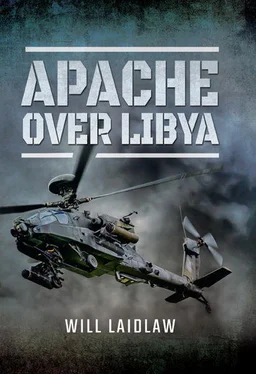Each Apache mission would be tightly coordinated with packages of protective jets. Fast movers tens of thousands of feet above us turned red into green on a PowerPoint slide and lowered risk from high to medium . Then CAOC planners could call it a ‘Go’.
The air campaign had the might of the most advanced weaponry that any nation could bring to bear, yet to the pundits Gaddafi showed no sign of stepping down after three months of intensive operations. The easy targets were long gone, and regime forces had wised up to the tactics that would keep them alive. Several contributing nations were wavering, and the loss of a helicopter and crew might have just tipped the balance in favour of a pull-out. NATO would have failed as a modern and relevant organization. The challenge was to find targets within the bounds of the ministerial submission that were relevant and would have an effect on the campaign, but without sending the aircraft into certain disaster.
On the first day of June I had a telephone conversation with Chris. He talked about the ROE and the Legal Adviser, an RAF Squadron Leader, who knew the task inside out. He mentioned the frantic pace and the meticulous detail that was considered for each target selection; then he told me where we would go for our first mission:
The jets have had a go at this one, but is too small. It’s a radar mounted on top of a mast about 80ft above the ground, and so far the bombs dropped on it have hit the ground beside it rather than the radar itself. It’s barely a metre across. After that we want you to go to a vehicle checkpoint. Pro-Gad is controlling the road, we want you to disrupt that.
‘What’s the threat?’ I asked.
‘We’re not expecting much if anything at the radar and you should be able to deal with that feet-wet. The VCP might be different. All sorts of stuff is moving through it so anything portable could be in play. There are no big air defence installations around, so you should not expect any of that. We need to be cautious with the ROE, be sure the targets are suitable and people are pro-Gad soldiers and you’ll be good to go.’
A little after lunch on Thursday, 2 June, the Commodore’s targeteer briefed us: ‘We have confirmed two targets for tomorrow night. The first is a coastal radar, the second is a pro-Gad vehicle checkpoint.’
PowerPoint slides of aerial reconnaissance photographs showed a radar mast with several associated buildings only a few hundred metres from the beach and miles from any town. The second slide showed the road, that road, the one that linked the whole coast of Libya, with a clearly armed checkpoint. Both targets were at the southern end of the Gulf of Sirte, near Brega.
She continued, ‘It’s up to you how you do it, but you need to back-brief the CAOC later today with the plan. They want attack headings, weapons, heights, the whole profile. They want some screenshots of your route too.’
The plan had to be made in detail. New radio procedures, new flying techniques, a whole world of threat, all had to be considered and understood. John Blackwell and I would be the lead, with Nick Stevens and Little Shippers as the wing. The flight to the target would be simple – straight in off the sea, one Apache firing, the other looking for threats. How to actually hit the target was less obvious.
‘We could hit the base of the radar mast. That would do it,’ I suggested.
‘Back yourself. Go for the top, hit the radar itself, it’ll go all over the place,’ Nick interrupted.
‘It’ll have to be perfect. The slightest wobble on the cross-hairs, the missile goes a fraction off, it will miss.’ I knew the first trigger pull of the mission had to be good.
This had become a challenge. An unspectacular Hellfire into the base of a mast might buckle the structure, sever cables and render it useless, but it would still look like a radar. Hitting the radar itself would be spectacular. The media message would be big and bright and carry a long way. Missing would leave me feeling rather embarrassed.
‘Then what? What if it misses?’
‘I won’t miss. But if that does happen, we’ll clear the area and Staff Blackwell will land beside the mast, I’ll get out, climb the thing, batter it with my Gerber knife, climb down again, get back in and we’ll all make best speed for the second target… And we won’t talk about it again.’
‘Good first shot then! No pressure, although the redacted guntape of you giving a radar an actual kicking will look great on Sky.’ Nick was pleased his idea had caught on and he was also happy to turn up the pressure!
Chapter 5
Feet-Dry in the Danger Zone
As Ocean made best speed for Libya, how not to die occupied my mind. It kept me working hard by day, with occasional dry retching over the aft railings on the quarterdeck. And it loomed dark over me in my cabin by night. This was real. We were about to launch big, slow-moving helicopters low-level into a war, with thousands of MANPADS, triple-A systems and various other nasty helicopter-catching weapons waiting for us on the coast. I was going to be in the front seat of the front aircraft on the first mission. All I could do to edge out the odds of perishing was plan and check, plan and check. In a quiet moment, on the quarterdeck, I asked the CO what we would do if the worst did happen.
‘We’ll fly the following night,’ was his answer. He didn’t need to think about it. ‘And if it’s you that’s gone,’ he added, ‘I’ll fly the following night.’
We were thinking the same thing; nothing more needed to be said on the subject.
Life was suddenly very serious. With two days to go I had to ask the aircrew to provide me with a few hundred words of sterile narrative on themselves to be used as a media release should the worst happen. Writing your own obituary takes you almost into bad luck territory, and I was unsurprised that most of them were agitated by the task. Washing it down with a bit of banter helped. ‘You did not invent lasso-dancing!’, ‘I didn’t know you went to a convent school’ and even ‘I didn’t know you went to school’ – all these bounced off the bulkheads. With the writing done, we all walked out on to the flight deck and, one by one, looked as strong as we could for the camera in front of an Apache – one of these pictures might accompany the words ‘Pilot Shot down in Libya’ or ‘Pilot Missing in the Mediterranean’. But we all got it done, locked it down and moved on.
The whole squadron was working flat out. If they weren’t at work, they were at rest ready to start work. The aircrew had been in a night routine since mid-May, and we kept to it. From the start it was clear that our missions would be flown at night. We had gradually reset our body clocks to sleep from 5.00 a.m. until just after lunch. This gave us the afternoon to plan and every hour of darkness to fly. With all ten of us in this routine, no one was spare to fly the odd morning air test or answer questions; but the simple fact was there were only five crews and they were needed, all five of them, every night. Two crews would be on the mission, the third crew would be in the Ops Room and the fourth and fifth crews had to check, fly and run up all the aircraft systems in the late afternoon. They were also the stand-by crews to fly as top cover for any rescue mission if anything went wrong on the night. Much thought had gone into pairing up the crews. Consideration was given to maritime and combat experience, but most of all to temperament. It was vital that a crew could cooperate under high levels of stress. There had to be a strong professional relationship, and everything rested on this. We had done the initial crewing assessment in April, but it was updated again for Libya. We now set the crews for war; thereafter we did everything together as crews – planning, flying, maintenance, manning the Operations Room, the lot.
Читать дальше












